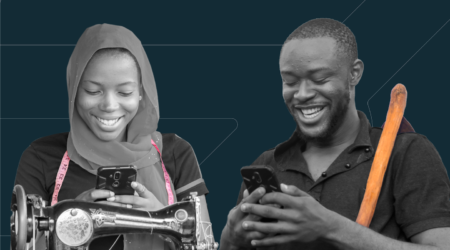Moving from conversation to action: How BFA Global drives gender intentionality

Women make up half the global population, yet face significant economic barriers like low literacy, restrictive norms, and unequal care burdens. These challenges limit their economic participation and decision-making power.
Women’s Economic Empowerment (WEE) is crucial to breaking these cycles. At BFA Global, we believe in intentional gender design to create transformative change. Our work focuses on bridging knowledge gaps, creating equitable opportunities, and fostering sustained participation. By addressing these key areas, we aim to empower women and unlock their full potential in the global economy.
Awareness and access: Bridging the knowledge gap
Challenge:
Women can’t engage in opportunities they don’t know exist or that are inaccessible to them. Barriers such as limited education, digital and financial literacy, restrictive cultural norms, and access to relevant tools prevent many women from realizing their full economic potential. For example, we often see that the lack of visibility or understanding of available opportunities results in fewer women founding startups or leading enterprises.
Our approach:
At BFA Global, we tackle these barriers by ensuring women have access to the information, resources, and networks they need to thrive. Through our TECA program, an initiative designed to launch ventures building climate resilience, we took intentional steps to engage female founders. In the program’s early stages, we achieved a 50% female participation rate by leveraging referrals from female founders and collaborating with relevant institutions that could provide a balanced pipeline. Building on this, we refined our strategy in the second phase by creating LinkedIn marketing posts that were customized for female entrepreneurs. We also used gender-sensitive language in our marketing, partnered with organizations that could connect us to potential women founders, and featured relatable African female entrepreneurs in our “How I Launched” series. While we did not change the assessment criteria, this strategic approach led to more women applying for the fund, with women making up 50% of TECA’s founders, a stark contrast to other mixed funds where female participation is much lower.
This is not an isolated success. Our holistic design approach ensures that more women see themselves in these opportunities and are empowered to participate. Through the Catalyst Fund, a venture capital fund and accelerator that supports founders building tech solutions for a climate-resilient future in Africa, our commitment to inclusivity in entrepreneurship has ensured that 35% of founders and 40% of users across the portfolio are women. Catalyst Fund’s investment strategy prioritizes business solutions that place a strong emphasis on the end-users. They invest in solutions that benefit women and women founders since they are more likely to address social needs.
We have learned that providing tailored, gender-sensitive outreach efforts increases women’s participation rates, laying a stronger foundation for long-term economic engagement.
—
Employment and entrepreneurship: Creating equitable opportunities
Challenge:
Women often face significant hurdles in employment and entrepreneurship, such as limited access to capital, skills gaps, biases in male-dominated sectors, and unequal job opportunities. These obstacles hinder their ability to enter and thrive in the economic sphere.
Our approach:
Through the Jobtech Alliance, a joint initiative with Mercy Corps, we focus on creating an inclusive Jobtech sector in Africa, connecting people to work opportunities that help build sustainable livelihoods. Partnering with platform providers to collect sex- and age-disaggregated data, we identify where biases exist and develop strategies to close these gaps. Our venture-building support helps analyze and address these challenges, leading to increased engagement and income for women. The latest data shows that 46% of Jobtech users are women, and 46% of users who earn quality incomes across these platforms are women—indicating that women are not just participating but outperforming in many areas.
Strive Mexico, a program we are co-implementing with Fundación Capital in Mexico also plays a crucial role in this ecosystem by focusing on growth-stage organizations serving micro and small enterprises (MSEs), especially those operated by women. These organizations receive tailored support to identify, build, and test features and solutions for MSE resilience that contribute to defining pathways for success. Our bespoke approach hones in on the features, products, or solutions that established organizations can offer their MSE customers to improve their resilience.
The Opportunity Leads Umbrella Fund project, another BFA Global initiative, focuses on improving livelihoods for low-income women in Kenya. This program was designed to center around improving market access for women, supported by pillars such as skills training, access to finance, and affordable childcare. By working with 10 partners across 7 sectors, the program aims to provide actionable, scalable insights to further enhance women’s economic empowerment through entrepreneurship.
Through these initiatives, we have learned that when women are equipped with the right tools and opportunities—especially those that address systemic barriers—they can lead inclusive, scalable solutions that benefit entire communities.
—
Sustained participation and impact: Building for long-term change
Challenge:
Sustaining women’s participation in the economy means going beyond initial access. Systemic issues like access to funding, wage inequality, job security, and the glass ceiling often prevent women from growing. The challenge is not just getting women in the door but ensuring they thrive in their respective activities.
Our approach:
BFA Global ensures that women can grow and sustain their economic activities. Programs like TECA don’t just support women in starting businesses; they help them scale. With 50% of TECA’s founders being women, we’re creating a strong pipeline of female entrepreneurs who can serve as role models and industry leaders. We offer specialized support including mentorship, resources, and visibility, tailored to the needs of female entrepreneurs. In our Jobtech portfolio, 46% of earners are women, which exceeds the overall regional participation of women in the economy, proving that women can succeed and contribute significantly to economic growth when given the opportunity 1World Economic Forum. (2023). Global Gender Gap Report 2023. Retrieved from weforum.org (World Economic Forum).
Sustained participation also requires ongoing support. That’s why both Jobtech Alliance and TECA integrate mentorship, professional development, and continuous learning into their designs. These programs have active alumni networks, where founders can not only receive support from BFA Global teams but also learn from each other. Our investment networks ensure that even after graduation, these women-led ventures continue to have access to the resources they need to succeed. This creates a cycle of sustained, self-improving change.
By intentionally designing these programs that address the specific needs of women, we make it easier for them to access opportunities and thrive in their roles. Equally important is making accommodations that recognize women’s dual responsibilities—both at home and in the workplace. Many women must balance their careers with caregiving and household duties, which often limits their ability to fully participate in professional or entrepreneurial opportunities. At BFA Global, we strive to remove this barrier by creating flexible program structures that allow women to meet their personal obligations while still pursuing their careers.
A major contributor to our intentional approach is the diversity within our own organization. With 50% of our staff being women, including in decision-making roles, we have the lived experience and perspectives to advocate for more inclusive internal policies and more thoughtful external engagements.
—
Moving from conversation to action
At BFA Global, our work is not just about discussing gender inclusion—it’s about driving action. Moving from conversation to action is essential for creating real change in women’s economic participation. Through intentional design across our programs, we address barriers that women face at different stages of their economic journey. Whether it’s increasing awareness, supporting entrepreneurship, or ensuring sustained participation, our holistic approach is creating a world where women are not only participants but leaders in the global economy. We are not stopping there and intend to ramp up our efforts to ensure we are at the frontlines of bringing about change. We invite investors, donors, policymakers, and innovators to join us in designing a future where women can fully participate and thrive economically. Together, we can move from conversation to impact.



